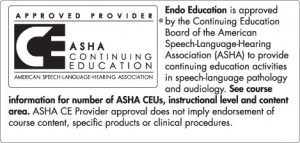International Course on Oropharyngeal Dysphagia
Session#3: Nutritional & Quality of Life Considerations in Dysphagia Management
Course Description
Session three begins with an overview of nutritional considerations in older, more vulnerable patients. The need to perform nutritional screenings and evaluations that isolate potential threats to nutritional status is mandatory. Interventions to optimize patient participation, cultural practices and caregiver training can be extremely beneficial in maintaining adequate levels of nutrition and averting placement of PEG tubes. The following lecture begins with a discussion about the immense social pleasures of eating and the dramatic ramifications that dysphagia can effect upon quality of life. Individuals may be unable to take part in cultural experiences and celebrations. The lecture continues with a discussion about prophylactic PEG tube placement with specific focus on patients with Head and Neck Cancer and the emotional toll that it plays on social and interpersonal dynamics. Dr. Keller continues with dialogue relating to the use of modified texture diets in patients with dysphagia. She provides examples of suboptimal and best practice principles relating to patient prescription, preparation and standardization. Specific techniques to enhance flavor and presentation are provided as a vehicle to drive increased patient consumption. The session concludes with a review of the water protocol and a review of the research study performed by Caren Carlaw at GF Strong Rehabilitation Center. The study incorporated a detailed algorithm to determine optimal candidacy and safety. The study validated positive outcomes from the study including elevated hydration levels and overall swallowing-related quality of life. No adverse effects were reported.
Time ordered agenda: 86 minutes
23min 39sec Feeding & Hydration in older adults: Elaine J. Amella, PhD, RN, FAAN
22min 55sec Burden of nutritional complications: Julie Locher , PhD, MSPH
21min 59sec Modified texture diets: Heather Keller , RD PhD FDC
18min 47sec What about water: Caren Carlaw , CCC-SLP
Learning Objectives
1. Review the importance of oral nutritional in geriatric patients.
2. Describe the impact of altered nutrition on quality of life in patients with dysphagia.
3. Discuss strategies to enhance consistency and outcomes in modified texture diets.
4. Review the methods and results of a successful water protocol.
